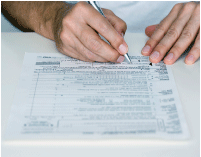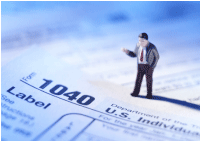CARL WATTS & ASSOCIATES
April 30, 2012

|
Washington DC
|
tel/fax 202 350-9002 |
|
The IRS says: “Self-employment tax is a tax consisting of Social Security and Medicare taxes primarily for individuals who work for themselves. It is similar to the Social Security and Medicare taxes withheld from the pay of most wage earners.”
 |
|
|
|
So, if you are a sole proprietor (including an independent contractor), a partner in a partnership (including a member of a multi-member limited liability company), or are otherwise in business for yourself, and if you had net earnings from self-employment of $400 or more, you are subject to self-employment tax, in addition to the income taxes. If you have church employee income of $108.28 or more, you are subject to self-employed taxes too.
|
|
|
|
The self-employment tax rate, as well as the employment tax rate, is set by Congress and is subject to change.
|
|
The tax is composed of Social Security and Medicare taxes in the form of a SECA (Self-Employment Contribution Act) tax for self-employment, and in the form of FICA (Federal Insurance Contributions Act) tax for employment.
|
|
In the last few years, SECA tax was set at 15.3% of gross earnings. The Social Security tax was set at 12.4% on the first $106,800 of net self-employment income, and the Medicare tax at 2.9% on all net self-employment income. |
|
For the tax years 2011 and 2012 only , the SECA (and FICA) tax is reduced by 2%. |
|
If a self-employed person, for 2011 and 2012 you will pay Social Security tax of 10.4% on the net self-employment income up to the Social Security wage base of $106,800, and the same 2.9% Medicare tax on your total self-employment income.
|
|
Half of the FICA tax is paid by the employer and only the other half of the tax is deducted from the employee’s wages.
 |
|
Therefore, as self-employed, when figuring out your adjusted gross income on Form 1040, you can deduct one-half of your Social Security tax. This deduction is calculated on Schedule SE. The Social Security Administration uses the information from Schedule SE to compute your benefits under the social security program. This deduction cannot be an itemized deduction and must not be listed on your Schedule C.
|
|
Under Section 2042 of the Small Business Jobs Act as a self-employed person you are also allowed a deduction, for income tax purposes, for the cost of health insurance. This deduction is taken into account in calculating your net earnings from self-employment.
|
|
It is worth mentioning that special rules apply to workers who provide in-home services for elderly and disabled as caregivers.
|
Self-Employment Tax
|
These services may or may not be provided by a family member. If the caregiver employee is a family member, the employer may not owe employment taxes even though the employer needs to report the caregiver's compensation on a Form W-2.
|
|
However, in some cases the caregivers are not employees. In such cases, the caregiver must still report the compensation as income of his or her Form 1040, and may be required to pay self-employment tax depending on the facts and circumstances.
|
|
Do you wander how you might reduce your self-employment tax?
 |
|
Your self-employment tax is calculated based on your net income from self-employment activities. Standard deductions and itemized deductions cannot affect the tax. The only way you can reduce the self-employment tax is by reducing your net income. For this to happen you don’t need to earn less, just increase your business-related expenses (Schedule C).
|
|
One other aspect that can have an impact on your self-employment tax is taking Section 179 deduction or bonus depreciation for your fixed assets.
|
|
If you have an unusually high income in a given year, you may want to elect Section 179 which allows you to deduct the cost of certain types of property purchased during the year as an expense instead of spreading out the cost over several years.
 |
|
|
|
Section 179 expense election applies to new or used business property purchased for use in an active trade or business., such as vehicles and machinery. However, Section 179 doesn't apply to land improvements, buildings or other items considered real estate. In addition, the code section is often revised to adjust the maximum dollar limitation of the expense election.
|
|
|
|
So, when are you expected to pay your self-employment tax?
|
|
|
|
To compensate for the lack of traditional payroll tax withholding by an employer, the IRS requires most self-employed individuals to make estimated quarterly tax payments. If you do not pay these taxes when due, the IRS may assess a substantial fine, even if you pay the full amount due by April 15.
|
|
If you expect to owe tax of $1,000 or more when you file your return, you generally have to make estimated tax payments.
|
 |
|
Troubles viewing this message? View in browser online here
|